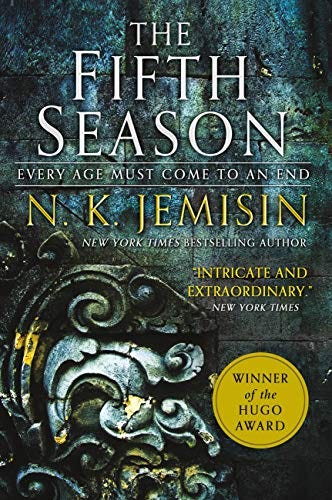SF/F Review - The Fifth Season
The Fifth Season, by N.K. Jemisin
Synopsis: This is a story of how the world ends.
Book Review: Holy shit guys.
Holy.
Shit.
I’ve read a number of Jemisin’s works. 100,000 Kingdoms was good. Killing Moon was great! Fifth Season is phenomenal. She just keeps. Getting. Better. This is what mastery of the art of written storytelling looks like. This is the sort of book that awards were created to celebrate.
2/3rds of the story lead up to an apocalyptic event. 1/3rd of it takes place after (not a spoiler, you find that out almost immediately, as the book jumps around in time), and has a very The Road feel. Grey ash coats everything, the protagonist is literally traveling on a road with a young boy in tow, bandits are starting raiding, etc. But this story takes place in a world were apocalypses are not uncommon. Every few hundred years, most of humanity is wiped out. So the entirety of their religious and civic culture is focused on how to survive an apocalypse.
This is embedded all the way down to how people identify themselves. Everyone has a Personal Name (Eneasz), a Community Name (Denver), and a Use Name (Accountant). Your very name tells everyone else what you are useful for, in case of apocalypse. Everyone is always evaluated (and evaluating others) on how useful they are to society. Your usefulness decides if you live or die. This is a culture whose most fundamental value is that people must be treated a Tools Of Survival. As Things rather than People. It is the only way humanity can survive.
It is very Grim Dark.
Also, our protagonists belong to a class of magic users who can accidentally kill everyone around them if they aren’t very careful. Constantly. They can never rest. As they grow in power, they can accidentally (or intentionally!) wipe out entire cities. This causes the muggles of their society to put them under extremely strict controls, because the magic users are SO useful for preserving society and preventing apocalypses, that they can’t just wipe them all out. This is a familiar theme for Dragon Age players, but it is done far better in Jemisin’s book. The sadistic-yet-loving control that the Guardians exert is deliciously creepy.
But more than anything, I love how angry the protagonists are. Because I love angry characters. I love when their anger is justified, and I love seeing what it drives them to do. I love it even more when those who are abusing our characters actually have a damn good reason to do so! (“We don’t want you to explode the world, tyvm”) This book is an exploration of slavery, and systemic oppression, sure. But it’s not about that, per se. It is about what drives a person(s) to extremes, and it immerses you completely in that journey.
This is the best book I’ve read in many years. It rocketed directly to #2 on my “Best Books I’ve Ever Read” list. The reasons for this are full of spoilers, so I’ll get into them in a separate post, because everyone should have a chance to read this book fresh. I know not everyone will have the same reaction I did, because this novel is for exactly the sort of person I am. Our protagonists are broken in the same way that I am broken. Do you know how good it feels to see that sort of broken portrayed? To see your rage, and hurt, and doubt, mirrored by an author you’ve never met, but who obviously feels all those things too? This story reached directly into my soul, grabbed hold, and squeezed. It left me breathless.
The wordcraft is masterful. The plotting—slowly revealing the layers of mystery by exploring them in the story, and adding new layers as old ones are uncovered—is flawless. The characters are deep, and true. I literally cannot say enough good things about this novel. Go, read it!!
Be advised it’s the first book in a trilogy.
Highly Recommended!
An Aside: If you liked Neon Genesis Evangelion, you will probably like this book.
Book Club Review: To get things rolling in our book club, we start by having everyone say a handful of things they liked about a book (in turn, going clockwise). Then everyone says a few things they disliked about a book. Discussion is allowed between points, of course.
The “What I loved” went as usual. But when we came to the “What we dislike about the book” part, everyone had one small quibble or annoyance they mentioned. Then they went right back into talking about more things they loved about the book. No one intended this, but there was just so much to love, and so many things to talk about, that even mentioning the one thing that irritated you just reminded you of more amazing stuff you had to mention.
Everyone liked this book, most people loved it. There is an overflowing bounty of things to discuss. You will not lack for conversation topics, or for enthusiasm. Again – Highly Recommended.




